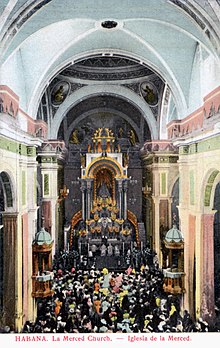Pastor Argudín Pedroso
Pastor Argudín Pedroso | |
|---|---|
| Born | Pastor Argudín y Pedroso April 9, 1880 Havana, Captaincy General of Cuba, Spanish Empire (now Cuba) |
| Died | 1968 |
| Other names | Pastor Argudín Y Pedroso, Pastor Argudin Y Pedroso, Pastor Argudin |
| Education | Academia Nacional de Bellas Artes San Alejandro, Real Academia de Bellas Artes de San Fernando |
| Occupation(s) | Painter, teacher |
| Awards | Order of Carlos Manuel de Céspedes |
Pastor Argudín Pedroso (1880 – 1968), also known as Pastor Argudín Y Pedroso,[1][2] was an Afro–Cuban portrait and genre painter, and teacher.[3][4] He was internationally exhibited and was awarded the Order of Carlos Manuel de Céspedes by the Republic of Cuba, for his artistic merit.
Biography
[edit]
Pastor Argudín Pedroso was born on April 9, 1880 in Havana, Captaincy General of Cuba, Spanish Empire (now Cuba).[5] Some citations state his birth year is 1889.[6] His Black parents had been enslaved in Havana; his father Argudín Lombillo was enslaved by the Casa de Lombillo in Habana Vieja, and his mother Maria de Jesus Pedroso had been enslaved by the Casa de Pedroso.[2][6] Argudín Pedroso attended one of Salvador José Zapata's elementary schools in Havana.[2] At a young age he studied art under Spanish painter and decorative artist, Francisco Piera.[2] He was promoted for his natural skills, and worked on painting the ceiling of the La Merced Church.[2]
He attended college at the Academia Nacional de Bellas Artes San Alejandro in Havana.[7] He studied at the Academy under Leopoldo Romañach, Armando Menocal, Luis Mendoza Sandrino, and Miguel Melero Rodriguez.[2] This was followed by a 1912 scholarship to study in Madrid, Spain at the Real Academia de Bellas Artes de San Fernando, where he conferred a bachelor's degree.[7] In Spain, he studied under José Moreno Carbonero, Miguel Blay, Cecilio Plá, and Gonzalo Bilbao.[2]
Argudín Pedroso lived and worked in France, Italy, and the United States during the 1920s and 1930s. He continued his studies at Accademia di Belle Arti di Roma in Rome; followed by study at the Académie de la Grande Chaumière in Paris under Émile-René Ménard.[2] Argudín Pedroso was a guest of Arturo Alfonso Schomburg, and lived at his house in Brooklyn, New York for almost one year in the 1930s.[8]
Argudín Pedroso is said to have painted some 300 portraits by 1937,[2] many of which were notable people. Some of his portrait subjects included Rafael María de Labra,[2] Cayetano Quesada (Cuban consul in New York City),[9] Arturo Alfonso Schomburg,[9] John La Farge,[9] Rev. John LaFarge Jr.,[9] and Abraham Lincoln,[10][11] among others. Argudin exhibited at the Société des Artistes Indépendants in Paris, starting around 1924;[12][13] and he was part of the noted group exhibition, "1933 Exhibition of the Work of Negro Artists", hosted by the Harmon Foundation at the Art Centre in New York City.[8]
Exhibitions
[edit]- 1915, National Exhibition of Fine Arts, Madrid, Spain; with painting, "Shepard With Flock of Sheep"[2]
- 1917, National Exhibition of Fine Arts, Madrid, Spain; awarded honorable mention with painting of Antonia la Castiza[2]
- 1919, Galerie des Elyesses, Paris, France[2]
- 1924, Exposition d'Art Américain-Latin, Cuba, Société des Artistes Indépendants[13]
- 1925, "Three Latin-American Canvasses", Musée Galliera (now Palais Galliera), Paris, France[2]
- 1929, Cuba building murals at Ibero-American Exposition of 1929, Seville, Spain[2]
- 1933, "1933 Exhibition of the Work of Negro Artists", Harmon Foundation, Art Center, New York City, New York, United States[8][14]
- 1935, "Pastor Argudin y Pedroso", solo exhibition, New York Public Library at the 135th St. Branch, Harlem, New York City, New York, United States[15]
- 1935, "Pastor Argudin y Pedroso", solo exhibition, Harmon Foundation headquarters, New York City, New York, United States[9]
- 1938, Harmon Foundation, Kenosha Historical and Art, Kenosha, Wisconsin, United States[16]
See also
[edit]References
[edit]- ^ Riggs, Thomas (1997). St. James Guide to Black Artists. St. James Press. p. 603. ISBN 978-1-55862-220-3.
- ^ a b c d e f g h i j k l m n o Schomburg, Arthur A. (1934-10-20). "Pastor Argudin Y Pedroso, Most Eminent Spanish Painter, A Negro, Says Schomburg". The New York Age. p. 4. Retrieved 2024-02-15 – via Newspapers.com.
- ^ The Legacy of Arthur A. Schomburg: A Celebration of the Past, a Vision for the Future. New York Public Library. 1986. p. 89.
- ^ Veigas, José, ed. (2002). Memoria: Cuban Art of the 20th Century. California/International Arts Foundation. ISBN 978-0-917571-11-4.
- ^ Peña, Esteban Valderrama y; Rodríguez, Benigno Vázquez (1952). La peinture et la sculpture à Cuba (in Spanish). Editorial Lex. p. 321.
- ^ a b "Pastor Argudín Y Pedroso". Bulletin of Research in the Humanities. Vol. 84. Readex Books. 1981. p. 189.
- ^ a b Fuente, Alejandro de la (2018-04-26). Afro-Latin American Studies: An Introduction. Cambridge University Press. p. 374. ISBN 978-1-107-17762-8.
- ^ a b c Sinnette, Elinor Des Verney (1989). Arthur Alfonso Schomburg, Black Bibliophile & Collector: A Biography. Wayne State University Press. p. 177. ISBN 978-0-8143-2157-7.
- ^ a b c d e "Noted Cuban Painter's Work Exhibited By The Harmon Foundation, Inc". The New York Age. 1935-02-23. p. 3. Retrieved 2024-02-16 – via Newspapers.com.
- ^ Courtney, W. B. (August 1949). "The Face Everyone Knows". Negro Digest. 7: 47–49. OCLC 671590707.
- ^ "Cuba Subject of Talk to Athena Group". Burlington Daily News. 1949-02-08. p. 5. Retrieved 2024-02-16 – via Newspapers.com.
- ^ "Argudin, Pastor". Benezit Dictionary of Artists. Oxford University Press. October 31, 2011. doi:10.1093/benz/9780199773787.article.b00006825. Retrieved 2024-02-15.
- ^ a b "Argudin Pedroso, Pastor". Transatlantic Encounters: Latin American Artists in Interwar Paris. Retrieved 2024-02-17.
- ^ Exhibition of Work by Negro Artists. New York City, New York: Harmon Foundation. 1933 – via The Metropolitan Museum of Art.
- ^ "Argudin y Pedroso, Pastor. (b. Havana, Cuba, 1889)". African American Visual Artists Database (AAVAD). Archived from the original on March 17, 2021.
- ^ "Negro Artists Productions in Art Exhibit Here". Kenosha News. 1938-07-07. p. 4. Retrieved 2024-02-16 – via Newspapers.com.
